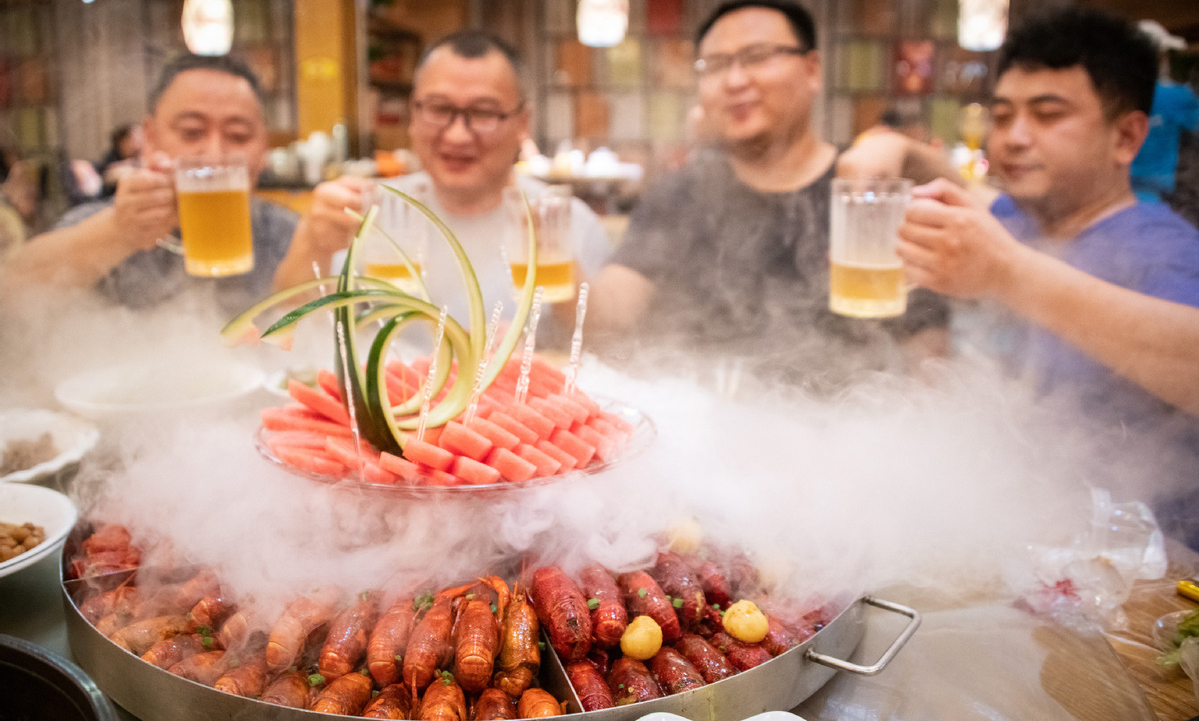New CE of HKSAR to focus on epidemic work, housing woes as first meetings begin
Four days after John Lee Ka-chiu, the new Chief Executive of the Hong Kong Special Administrative Region (HKSAR), and his team were sworn into office, both executive and legislative work has been launched with the main focus on the border opening to resume Hong Kong's status as an international hub, civil servant pay rises and fixing housing woes. By cooperating rather than confronting each other, the local governance is expected to become more practical and efficient in resolving pressing issues, observers said.
Lee, along with 16 senior unofficial members, held the first Executive Council meeting on Tuesday, vowing to work on issues such as shortening the quarantine period for arrivals and balancing anti-epidemic work with the city's status. Following the meeting, the government proposed an increase in pay of 2.5 percent for local civil servants, an issue that dragged on for weeks after Carrie Lam - Lee's predecessor - decided to leave it to the next administration to handle, according to media reports.
Regina Ip Lau Suk-yee, the convenor of the meeting, said 16 senior unofficial members at the meeting are professionals in legislation, public health and finance, who will be brought together to "provide the best advice to the CE and cooperate with his work."
In addition to pay rises for civil servants, another major issue of concern is Hong Kong's resumption of international travel as well as opening its border with the Chinese mainland, given how the COVID-19 epidemic over the past two years significantly had affected cross-border business and people-to-people exchange.
Lee said that as an international city, Hong Kong has been affected by the epidemic, but now has to contain it. "If the infection numbers increase, the chances of people being hospitalized will also increase, which will affect the medical system," he said.
The CE also said he has asked the public health bureau director to pay close attention to the relevant numbers and to come up with corresponding plans. Meanwhile, authorities are actively discussing measures to facilitate travel, including shortening the quarantine period.
On Wednesday, Lee will attend his first Legislative Council Question and Answer (Q&A) session after taking office. Lawmakers have reportedly been asked to focus their questions on seven areas of public concern mentioned in a recent speech by Chinese President Xi Jinping such as anti-epidemic work, land and housing supply, innovation and youth development.
Nixie Lam, lawmaker-elect from the Election Committee constituency, told the Global Times on Monday that if she has the chance, she will ask Lee about the plan to reopen the border, which is the most important thing at present. "Border opening will also help the resumption of youth exchange between Hong Kong and the mainland, which has been halted for a long time," she said.
Also, Hong Kong has to figure out how to balance anti-epidemic work and international exchanges, as frequently changing policies will affect business confidence, Nixie Lam said, noting that if the Hong Kong and mainland could come up with a standardized protocol and align their epidemic measures, it would be helpful for resuming business and people-to-people exchange.
Hong Kong's new Health Secretary Lo Chung-mau posted a blog on Monday, expressing hope for the border between Hong Kong and the mainland to be opened by August 4, noting that containing the epidemic in Hong Kong and reducing community transmission are the most important factors for cross-border exchange and border reopening.
"I hope that the epidemic will be brought under control. With the joint cooperation between Hong Kong and Shenzhen, more people need to return to the mainland for family reunions," Lo said.
The health secretary also noted that the daily quota for centralized quarantine sites is about 1,300 in Shenzhen, and while the country shortened the quarantine time from 14 days to seven days, the demand for quarantine places has increased. Currently, the local authority in Shenzhen has increased the quota from 1,300 to 2,000.
Li Xi, Party secretary of the Guangdong Provincial Committee of the Communist Party of China, said at a meeting on Sunday that it should strengthen the joint anti-epidemic work in the Greater Bay Area in order to minimize the impact of the epidemic on economic and social development and people's lives.
Other work priorities include increasing housing supply, as the housing woes are considered a deep-seated problem that Hong Kong society is facing. Lee said he will accelerate the housing plan in order to shorten the waiting time for public housing, and the new HKSAR government will report its relevant new ideas within its first 100 days in office.
In response to this urgent issue, Lee has included two working groups in taking action with regard to both housing and land supply, and he also stressed that he is not a "slogan-driven" CE.
Some lawmakers claimed that setting the scope of the questions for the Q&A sessions of LegCo would damage its monitoring and questioning functions, according to media reports. It may also give the wrong impression that Lee does not have the confidence to respond to lawmakers' questions.
Andrew Leung Kwan-yuen, the LegCo president, was quoted as saying in media reports on Tuesday that it's not an uncommon practice, and has been described in the provisions of rules of procedure as a general and constant practice. While the Q&A session for the CE has set the scope of discussion, the former administration did not use this approach, he said.
"This practice is actually a good exploration for the HKSAR to achieve the goal of effective governance," Li Xiaobing, an expert on Hong Kong, Macao and Taiwan affairs from Nankai University, told the Global Times on Tuesday.
In the past, the executive and legislative branches in Hong Kong confronted each other, which was not helpful for local governance. The Q&A session itself is a way of monitoring the CE's explanation of his policies, forming a favorable interaction between the execution and legislature for effective governance, Li said.
When asked whether he will enact the legislation of Article 23 in his first year in office, Lee said the HKSAR government has the Constitutional responsibility to carry out local legislation work. By taking the most severe national security risk into account, he hopes that the legislation will help deal with any predictable issues, and will not need amendments. The provisions of other countries or regions could be referred to.
Photos
Related Stories
- Commissioner's office of Chinese Foreign Ministry in HKSAR condemns gross interference in China's internal affairs
- Xi's address at meeting celebrating 25th anniversary of Hong Kong's return to motherland, inaugural ceremony of sixth-term HKSAR government published
- Chinese Wisdom in Xi's Words: Those enjoying benefits and joy of all people should also share their burdens and concerns
- Hong Kong to make new achievements on new starting point
- Flag-raising ceremony held to celebrate 25th anniv. of HK's return to motherland
Copyright © 2022 People's Daily Online. All Rights Reserved.









